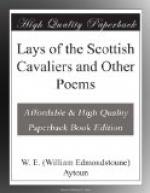Sleep in peace with kindred ashes
Of the noble and the true,
Hands that never failed their country,
Hearts that never baseness knew.
Sleep!—and till the latest trumpet
Wakes the dead from earth and sea,
Scotland shall not boast a braver
Chieftain than our own Dundee!
THE WIDOW OF GLENCOE
The Massacre of Glencoe is an event which neither can nor ought to be forgotten. It was a deed of the worst treason and cruelty—a barbarous infraction of all laws, human and divine; and it exhibits in their foulest perfidy the true characters of the authors and abettors of the Revolution.
After the battle of Killiecrankie the cause of the Scottish royalists declined, rather from the want of a competent leader than from any disinclination on the part of a large section of the nobility and gentry to vindicate the right of King James. No person of adequate talents or authority was found to supply the place of the great and gallant Lord Dundee; for General Cannon, who succeeded in command, was not only deficient in military skill, but did not possess the confidence, nor understand the character of the Highland chiefs, who, with their clansmen, constituted by far the most important section of the army. Accordingly no enterprise of any importance was attempted; and the disastrous issue of the battle of the Boyne led to a negotiation which terminated in the entire disbanding of the royal forces. By this treaty, which was expressly sanctioned by William of Orange, a full and unreserved indemnity and pardon was granted to all of the Highlanders who had taken arms, with a proviso that they should first subscribe the oath of allegiance to William and Mary, before the 1st of January, 1692, in presence of the Lords of the Scottish Council, “or of the Sheriffs or their deputies of the respective shires wherein they lived.” The letter of William addressed to the Privy Council, and ordering proclamation to be made to the above effect, contained also the following significant passage:—“That ye communicate our pleasure to the Governor of Inverlochy, and other commanders, that they be exact and diligent in their several posts; but that they show no more zeal against the Highlanders after their submission, than they have ever done formerly when these were in open rebellion.”
This enigmatical sentence, which in reality was intended, as the sequel will show, to be interpreted in the most cruel manner, appears to have caused some perplexity in the Council, as that body deemed it necessary to apply for more distinct and specific instructions, which, however, were not then issued. It had been especially stipulated by the chiefs, as an indispensable preliminary to their treaty, that they should have leave to communicate with King James, then residing at St. Germains, for the purpose of obtaining his permission and warrant previous to submitting themselves to the existing government. That article had been sanctioned by William before the proclamation was issued, and a special messenger was despatched to France for that purpose.




